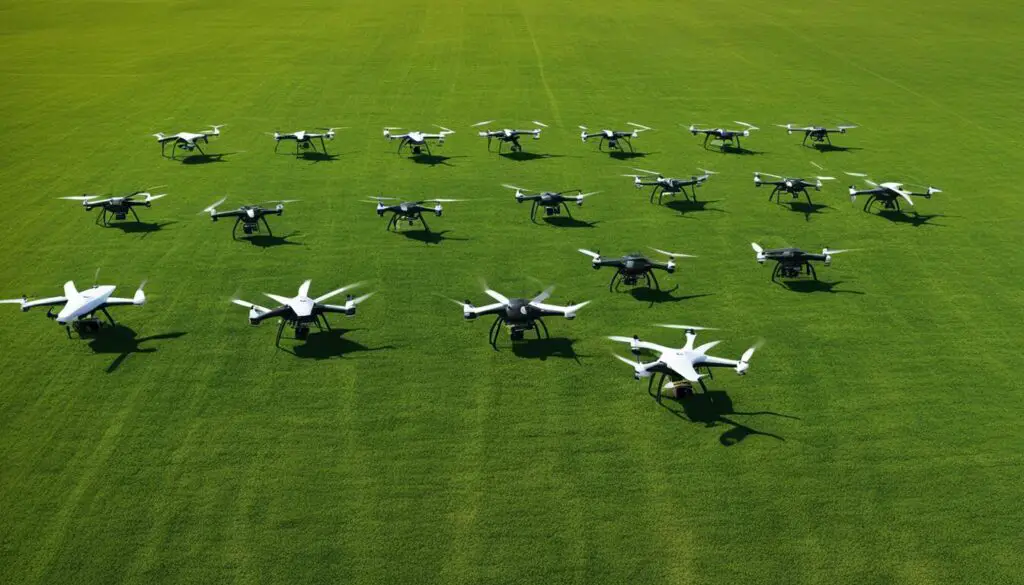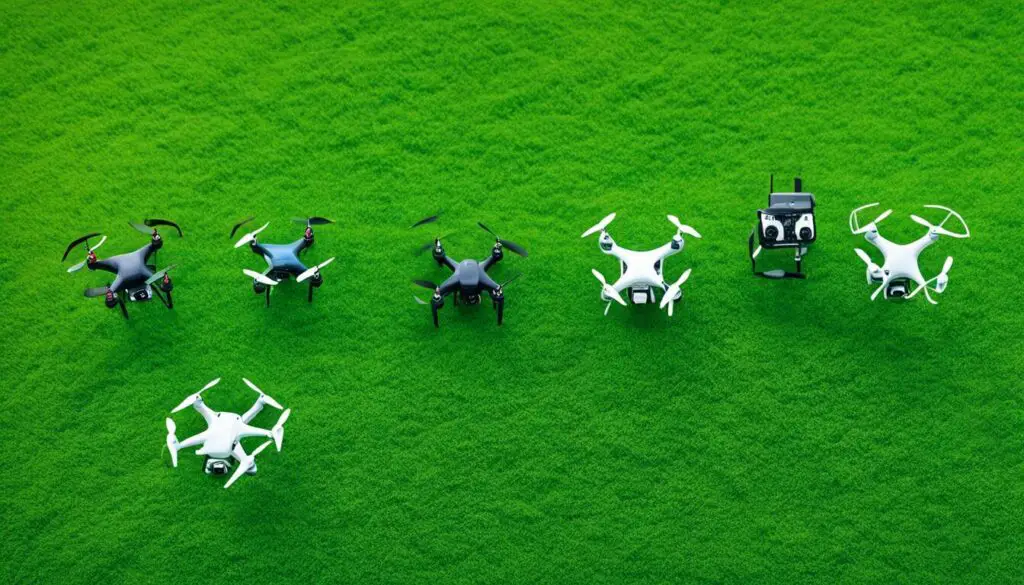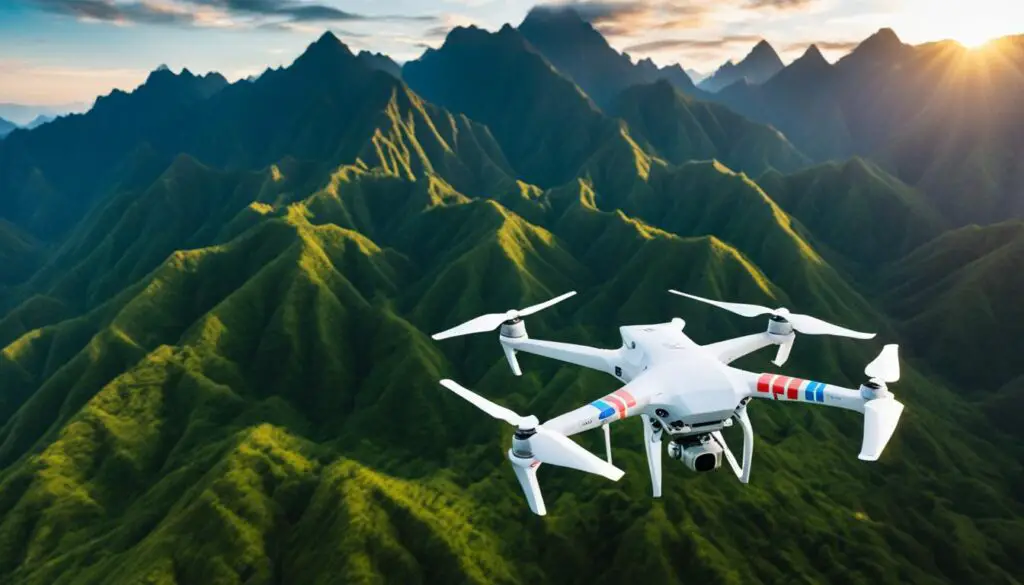
The world of unmanned aerial vehicles (UAVs) is rapidly expanding, and the role of UAV Pilots is becoming increasingly critical in driving forward aerial innovation. As a UAV Pilot, you will have an exciting and challenging career operating and controlling unmanned aerial vehicles and driving forward the industry’s development in various fields. This article explores the possibilities in this burgeoning industry, detailing the opportunities and pathways available for aspiring UAV Pilots.
Through the use of advanced technology, UAVs are playing an increasingly important role in various industries. With their ability to perform complicated tasks from the air, unmanned aerial technology is helping to save time, reduce costs, and provide solutions beyond human capabilities. As a result, the demand for UAV Pilots is growing, and the industry is expanding worldwide.
In this article, we will explore the various aspects of the UAV Pilot career, including the responsibilities, required skills, entry opportunities, and promotion prospects. We will also examine the UAV Pilot career in different regions worldwide, including Europe and the United States, and highlight the regions with the highest demand for UAV Pilots.
Follow us on this exciting UAV journey and explore this innovative career option!
Job Profile of a UAV Pilot
UAV Pilots play a crucial role in the unmanned aerial industry, where they are responsible for operating and controlling unmanned aerial vehicles (UAVs) used in various applications, such as aerial photography, surveying, mapping, and surveillance.
The job profile of a UAV Pilot typically involves:
- Preparing flight plans and conducting pre-flight checks
- Operating and monitoring UAVs during flight
- Interpreting flight data and making adjustments to UAVs as needed
- Ensuring compliance with airspace regulations and safety guidelines
- Maintaining UAV equipment and conducting repairs
- Collaborating with other professionals in the industry, such as engineers, technicians, and clients
Besides the technical skills required for a UAV Pilot career, successful professionals in this field possess critical thinking abilities, decision-making skills, and excellent communication skills. They should be comfortable working in a dynamic, fast-paced environment and have a good understanding of UAV regulations and airspace restrictions.
To become a UAV Pilot, aspiring candidates must undergo specialized training and acquire certifications from accredited organizations such as the Federal Aviation Administration (FAA) or international equivalents. These training programs cover a range of topics, including UAV operation and maintenance, safety procedures, and airspace regulations.
A career as a UAV Pilot offers opportunities to work in exciting and rapidly developing industries such as agriculture, filmmaking, and environmental monitoring. The demand for qualified UAV Pilots is expected to grow in the coming years as the technology continues to advance and diversify, making it an attractive career option for individuals passionate about aviation and aerial innovation.
Entry Opportunities for UAV Pilots
If you’re considering becoming a UAV Pilot, there are several entry opportunities available to help you get started in this exciting field. One path is through education and certification programs, which provide the theoretical knowledge and practical skills needed to operate unmanned aerial vehicles.
If you have a military background, you may find that your experience and training could open up entry opportunities to UAV Pilot positions. Military experience can be a valuable asset in this field, with many skills and principles easily transferable to the UAV industry.

On-the-job training is another way to enter the field of UAV piloting. Many companies provide training programs to their employees, with a focus on operational procedures, safety, and flight planning. Starting as a technician or operator can also provide a pathway to becoming a UAV Pilot.
| Type of Entry Opportunity | Description |
|---|---|
| Education and Certification Programs | These programs provide theoretical knowledge and practical skills for operating unmanned aerial vehicles. |
| Military Experience | For individuals with a military background, experience and training can be transferable to the UAV industry. |
| On-the-Job Training | Many companies provide training programs to their employees, which can provide a path to becoming a UAV Pilot. |
Regardless of the entry point, it’s important to obtain the necessary qualifications and to continue developing and refining your skills throughout your career as a UAV Pilot.
Countries with High Demand for UAV Pilots
Unmanned Aerial Vehicles (UAVs) have been increasingly adopted in various sectors worldwide, which has led to a surge in demand for UAV Pilots. Some countries, in particular, have witnessed significant demand growth as a result of their thriving UAV industries and the presence of supportive regulatory environments for drone operations.
The following countries are recognized for their high demand for UAV Pilots:
| Country | Reason for High Demand |
|---|---|
| United States | The United States is home to one of the largest UAV markets and has been actively using drones for various applications such as precision agriculture, infrastructure inspections, and search and rescue operations. |
| China | China has a rapidly growing UAV industry that is hinged on the demand for consumer drones and applications for commercial use, such as package delivery and crop spraying. |
| Israel | Israel is a leader in the defense industry and has been using UAVs for military operations, spurring requirements for skilled pilots. |
| United Arab Emirates | The UAE has been investing significantly in UAV technology and has attracted global companies to the region for drone-related activities such as aerial mapping and surveying, creating a high demand for UAV Pilots. |
| India | India has a growing UAV industry with applications in fields such as oil and gas, power transmission, and agriculture, creating opportunities for skilled UAV Pilots. |
Joining the growing industry of UAV Pilots, whether in these countries or others, can lead to exciting career opportunities and potential for technological innovation in unmanned aerial systems.

The Situation of UAV Pilot Career in the U.S.
The UAV Pilot career is rapidly expanding across the United States, and this article outlines the current status of this profession. According to the Bureau of Labor Statistics (BLS), the demand for unmanned aerial vehicles is projected to increase in the coming years, which should, in turn, lead to an increase in job opportunities for UAV Pilots.
One of the most significant advantages of becoming a UAV Pilot in the U.S. is the diversity of industries where opportunities exist. Currently, UAV Pilots are in high demand in the agriculture, energy, and construction sectors. Furthermore, the government and defense sectors also provide significant opportunities for UAV Pilots.
The table below shows the median salary for UAV Pilots in different U.S. states, according to BLS data in May 2020. Note that the salaries may vary depending on experience, education, and industry specialization.
| State | Median Salary |
|---|---|
| California | $85,790 |
| Texas | $69,220 |
| Florida | $72,790 |
| North Dakota | $61,220 |
| Colorado | $71,940 |
In terms of educational requirements, UAV Pilots must comply with the Federal Aviation Administration (FAA) regulations, which mandate that they must hold a Remote Pilot Certificate. To obtain this certificate, they must pass an exam that assesses their aeronautical knowledge.
Overall, the situation of the UAV Pilot career in the U.S. is promising, with significant potential for job growth and career advancement opportunities.
The Situation of UAV Pilot Career in Europe
Europe has been a leading region in the development and implementation of unmanned aerial vehicle (UAV) technology. With growing industry demand, the career prospects for UAV Pilots in Europe look promising.
Growth and Development
Several European countries, including France, Germany, and the United Kingdom, have invested heavily in UAV technology, driving the growth and development of the industry. With increased investment, the industry’s potential for growth and expansion looks promising, providing a range of opportunities for aspiring UAV Pilots.
Regulatory Environment
The regulatory environment for UAV technology in Europe is still evolving, but there have been significant strides in recent years. The European Union Aviation Safety Agency (EASA) has introduced new regulations and guidelines for the operation of UAVs, ensuring safe and responsible use of the technology. With these regulations, UAV Pilots in Europe can work with confidence and assurance that their operations are meeting the required safety standards.
Job Prospects
There is a growing demand for UAV Pilots in Europe, particularly in the fields of agriculture, construction, and surveying. With technological advances and increasing adoption rates in these sectors, the job prospects for UAV Pilots in Europe look promising. Additionally, as the industry continues to grow, there may be opportunities for Pilots to advance into managerial positions or specialize in specific areas of the technology.
Overall, the UAV Pilot career in Europe offers exciting opportunities for individuals interested in unmanned aerial technology. With a supportive regulatory environment and a growing industry demand, Europe presents a promising market for those looking to pursue a career in this field.
The Situation of UAV Pilot Career in Other Regions
While the U.S. and Europe remain leading regions for UAV Pilot careers, other regions are also seeing growth in unmanned aerial technology. The situation for UAV Pilots varies depending on the region, with some areas providing more opportunities and demand than others.
One emerging market for UAV Pilots is the Asia-Pacific region, where countries like China and Japan are investing heavily in drone technology. In these countries, UAV Pilots are seeing increased demand in industries such as agriculture, surveying, and logistics. However, the regulatory environment in Asia-Pacific can be complex and may require additional certifications and licenses for UAV Pilots.
Africa is another region where unmanned aerial technology is beginning to take off. Countries like South Africa and Kenya are exploring the use of drones in conservation efforts, infrastructure monitoring, and medical supply delivery. While the industry is still in its early stages in Africa, there are opportunities for UAV Pilots to contribute to these efforts.
Latin America also offers potential for UAV Pilot careers, particularly in industries like mining and oil and gas. Countries like Brazil and Mexico have seen increased investment in drone technology, with UAV Pilots in these areas playing a vital role in operations and maintenance.

Comparison of UAV Pilot Career Opportunities in Other Regions
| Region | Leading Industries | Regulatory Environment | Job Prospects |
|---|---|---|---|
| Asia-Pacific | Agriculture, surveying, logistics | Complex, may require additional certifications and licenses | Increasing demand with growth potential |
| Africa | Conservation, infrastructure monitoring, medical supply delivery | Regulatory environment still in development | Emerging market with potential for growth |
| Latin America | Mining, oil and gas | Regulatory environment varies by country | Increased investment and demand in certain industries |
While the UAV Pilot career may not be as established in these regions as in the U.S. and Europe, there are still opportunities for professionals who are willing to navigate regulatory environments and contribute to the growth of unmanned aerial technology in emerging markets.
Training and Studies for UAV Pilots
Aspiring UAV Pilots require a combination of theoretical and practical training to develop the necessary skills to operate unmanned aerial vehicles.
At a minimum, candidates must have a high school diploma or GED. However, a college degree or specialized training program vastly improve a candidate’s ability to secure employment in this field.
One popular educational option is an FAA certified training program, such as those offered by Drury University, Embry-Riddle Aeronautical University, and the Unmanned Vehicle University. These programs provide extensive training in various aspects of unmanned aerial vehicles, including operations, maintenance, and Federal Aviation Administration regulations.
Candidates should also consider obtaining certifications from organizations such as the Association for Unmanned Vehicle Systems International (AUVSI) or the Remote Pilot Association (RPA). These certifications demonstrate a candidate’s commitment to the industry and validate their knowledge and abilities.
Sample table for Degree Programs and Certifications
| Degree Programs | Certifications |
|---|---|
| Bachelor of Science in Unmanned Aircraft Systems Science – Embry-Riddle Aeronautical University | Remote Pilot Certificate – Remote Pilot Association |
| Master of Science in Unmanned Systems – Kansas State University | AUVSI Trusted Operator Program Certificate |
| Associate of Applied Science in Unmanned Aircraft Systems Operations – Northwest College | AUVSI Remote Pilot Certificate |
Specialized training courses are also available for UAV Pilots looking to further develop their skills. These include courses focused on aerial photography, surveying, mapping, and software programming. Continued education and training are crucial for UAV Pilots to stay up-to-date with advancements and regulations in the industry.
Development Opportunities and Promotion Prospects
UAV Pilots have various development opportunities that can enhance their skills and help them advance in their career. For instance, they can specialize in different sectors such as agriculture or construction, where unmanned aerial vehicles are widely utilized. They can also improve their managerial and leadership skills to advance to the position of a team leader or supervisor.
Furthermore, promotion prospects in this career are significant. As the demand for unmanned aerial technology continues to grow, UAV Pilots can expect increased job responsibilities and higher pay scales. They can also progress into senior positions such as chief pilot or operations manager, where they oversee and manage other UAV Pilots.
However, like with any profession, development opportunities and promotion prospects for UAV Pilots largely depend on their performance, experience, and qualifications. Therefore, aspiring UAV Pilots must commit to acquiring the necessary education, training, and experience to thrive in this exciting and dynamic career.
Questions and Answers
What are the tasks and responsibilities of a UAV Pilot?
UAV Pilots are responsible for operating and controlling unmanned aerial vehicles. They perform tasks such as flight planning, pre-flight checks, executing flight missions, monitoring aerial data, and maintaining the equipment.
What skills and training are required to become a UAV Pilot?
To become a UAV Pilot, individuals need to have strong technical skills, including knowledge of aerial technology, remote sensing, and data analysis. They also need to undergo specialized training in UAV operations and obtain relevant certifications.
What are the entry opportunities for aspiring UAV Pilots?
There are several paths to enter the UAV Pilot profession. Some individuals acquire the necessary skills and training through education programs and certification courses. Others gain experience through military service or start as UAV technicians and work their way up to becoming Pilots.
Which countries have a high demand for UAV Pilots?
Countries such as the United States, China, Australia, and the United Arab Emirates have a high demand for UAV Pilots due to the growth of the unmanned aerial industry. These regions offer numerous opportunities for career development and advancement in this field.
What is the current situation of the UAV Pilot career in the United States?
The UAV Pilot career in the United States has seen significant growth in recent years. The industry has expanded across various sectors, including agriculture, construction, and public safety. The demand for skilled UAV Pilots is expected to continue to rise, providing ample career opportunities.
How is the UAV Pilot career in Europe?
Europe has also experienced substantial growth in the UAV Pilot career. Different countries in Europe have implemented regulations to ensure safe and controlled UAV operations. The industry offers diverse job prospects and development opportunities for aspiring UAV Pilots in this region.
How is the situation of the UAV Pilot career in other regions?
The UAV Pilot career is also growing in other regions outside of the U.S. and Europe. Emerging markets in Asia, the Middle East, and Africa are witnessing increased demand for UAV Pilots. These regions offer unique challenges and opportunities for professionals in this field.
What training and studies are necessary for aspiring UAV Pilots?
Aspiring UAV Pilots should consider pursuing relevant degree programs in fields such as aviation, remote sensing, or aeronautical engineering. They should also undergo specialized training and obtain certifications in UAV operations, flight planning, and aerial data analysis.
What development opportunities and promotion prospects exist for UAV Pilots?
UAV Pilots have various development opportunities and promotion prospects. They can advance to managerial roles within UAV operations, become instructors or trainers, or specialize in specific sectors such as agriculture, cinematography, or surveying. Continuous learning and gaining industry experience are key to career progression in this field.
